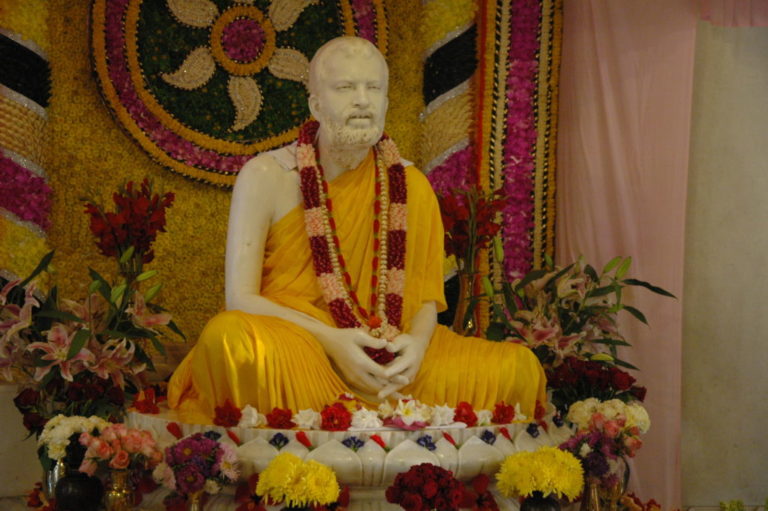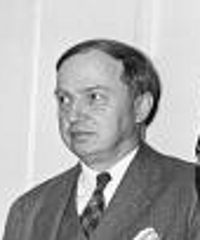Autumn was succeeded by the ‘season of dew’ and winter. Spring, the ‘king of the seasons’, had arrived. There was a pleasant softness in the air, and all creation was pulsating with new life. The lovely month of Phalgun— neither hot nor cold—was only six days old. There was a great surge of love in nature which, in its beauty, manifested—as the scriptures say—a particle of the bliss of Brahman latent in all things. Of all the seasons, spring has received just a little more of that divine effulgent bliss, since it showers on the world so great a joy.
1. Chandradevi’s apprehension was removed by her husband
Chandradevi’s time of delivery was near at hand, and the heart was filled with a celestial joy as she prepared the daily food offering for Raghuvir. But in her body there was a feeling of great lassitude. Then suddenly the thought came that something might happen at any moment, and that, if she should deliver just then, there would be nobody in the house to prepare the offerings. What was she to do? Alarmed, she told her thoughts to her husband. Kshudiram put her mind at rest saying, “Fear not. Surely He who is now in your womb will not, by His birth, become a hindrance to the worship and service of Raghuvir. Don’t be anxious; certainly you will be able to manage the service of the god today. I have already arranged for the service from tomorrow, and Dhani has been asked to sleep here from tonight.” At this Chandra felt a new strength in her body and cheerfully went on with her household duties. It happened exactly as Kshudiram had said. The midday and evening offerings to Raghuvir and the other services to Him were finished without a single hitch. Kshudiram and Ramkumar went to bed after taking their night meal; and Dhani came and lay in the same room with Chandradevi. Besides the shrine-room of Raghuvir, there were two bedrooms with a thatched roof, and a kitchen. In another small room there was a husking machine on one side, and, a fire-place for boiling paddy on the other. For want of a better place, this room, which also had a thatched roof, was kept ready for Chandra’s confinement.
2. The birth of Gadadhar
It was some ten minutes before dawn that Chandradevi felt the first pangs of labour. Dhani helped her to the lying-in room, and there, almost immediately, she gave birth to a male child. After doing the needful for Chandra, Dhani turned her attention to the baby only to find that it had disappeared from the place where she had kept it. In alarm she took the lamp to look for the child and found that it had rolled down the ground covered with blood and slime into the hollow fireplace and was lying there, with its little body adorned with ashes, and still not crying! Dhani tenderly picked up the child, washed it, and looking at it in the light wondered at its beauty and its size. It looked like a six-months-old infant! Chandramani’s friends, Prasanna and other women of the Laha family, were sent for. As soon as they arrived, Dhani told them what had happened. At the sacred solemn hour before sunrise, the sound of the conch filled that humble cottage— the scene of Kshudiram’s austerity—and proclaimed to the world the advent of a great soul. Ascertaining the signs of the zodiac under which the child was born, Kshudiram, well versed in astrology, found that the boy had come into the world at an especially auspicious moment.
3. The astrological signs at the moment of Gadadhar’s birth
It was, according to the Hindu calendar which reckons the day from sunrise to sunrise, Wednesday, the sixth day of Phalgun in B.E. 1242, or 1757 of the Saka year, or Thursday, February 18, A.D. 1836 according to Gregorian calendar. The child was born just twelve minutes before sunrise. The auspicious second lunar day of the bright fortnight and the twentyfifth of the lunar constellations (Purvabhadrapada) had combined to bring about the happy astrological conjunction called the Siddhiyoga. The Sun, the Moon and Mercury had come together in the sign of the zodiac under which the boy was born. Saturn had then reached the highest point of the zodiac, indicating that the boy would have a unique life. Calculations according to the method of the great sage, Parasara, showed that the ‘planets’ Rahu and Ketu occupied the highest point of the zodiac and were in the ascendant. Finally, Jupiter which was then beginning to rise, also exerted a strong and auspicious influence on the child’s destiny.
4. Gadadhar’s name according to the constellation at the time of birth
Later, well-known astrologers also said that the time1 of birth came under a very auspicious sign of the zodiac (Lagna or Rasi), which indicated, beyond all doubt, that the person concerned “would be virtuous and respected and would always perform good deeds. Surrounded by many disciples, he would live in a temple; would found a new institution for teaching religion, generation after generation; and would be universally revered as a great soul born as a part of Narayana.” On hearing this Kshudiram’s mind was full of wonder, and his grateful heart felt that his divine dream at Gaya had actually come true. He then performed the birth-ceremony and named the boy Sambhuchandra after the sign of the zodiac under which he was born; but in memory of his remarkable dream, he decided to call him Gadadhar, by which name he was afterwards known.
Looking at the face of their beautiful child, and assured of his unique destiny, Kshudiram and Chandramani thought themselves blessed. They performed the ceremony of taking the child out for the first time and naming him, and determined to bring him up with great care.
Footnote
1. The detailed description of Sri Ramakrishna’s horoscope appearing in this chapter has been transferred to the appendix at the end of the volume.—Tr.

